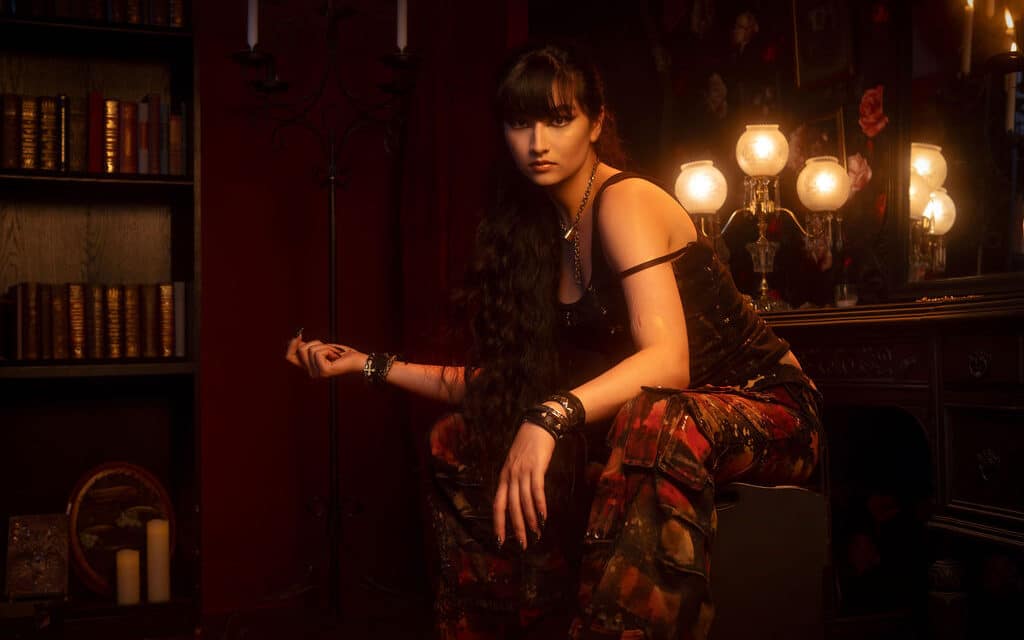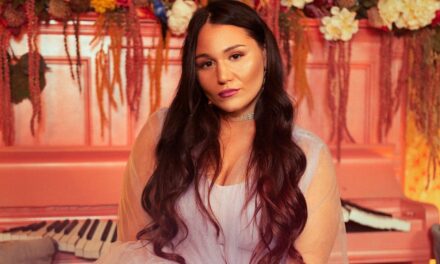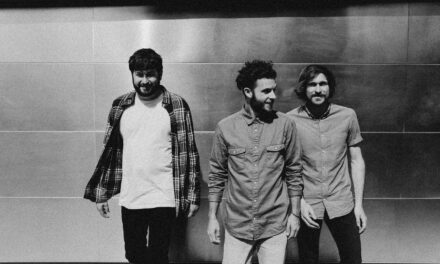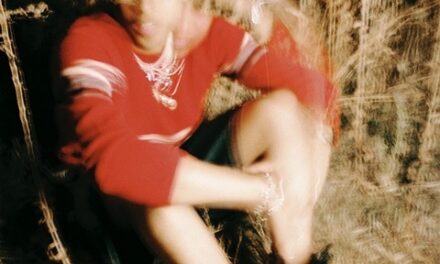Photo Credit- Andrea Hunter
Tokyo-born alt-rock provocateur Sarina has unleashed her new EP The Fool—a six-song body of work that doesn’t just blur the line between punk ferocity and alt-rock theatricality, but slices it wide open. Where her earlier projects leaned into polished pop, The Fool thrives in chaos, shadow, and catharsis, serving as both diary and dagger.
At its core, the EP wrestles with identity—the masks we wear, the villains we’re made into, the glittering facades that fracture under pressure. Inspired by tarot’s The Fool card, the collection takes on layered archetypes: the jester who sees the truth, the scapegoat cast as the problem, the dreamer daring to step into the unknown. “Even beyond tarot, ‘The Fool’ can be many things,” Sarina shares. “The poor soul played. The jester exempt from law. Yet still reflecting strength and new beginnings. It felt like the perfect fit to encapsulate this EP.”
Produced by Kevin Thrasher (Panic! At The Disco, Blink-182, MGK) and mastered by Grammy-nominated engineer Maor Appelbaum (Dream Theater, Sepultura, Rob Halford), The Fool surges with rage, resilience, recklessness, and release.
Track by Track: A Descent and an Ascension
The EP explodes open with “Toast to the Broken”, a snarling pop-punk anthem that finds beauty in fury and restlessness. “Siren or the Sailor” plunges into darker waters with a chilling line—“hold your breath, you’re only drowning”—while “Race with no End” flips the mood, urging defiance and self-belief in the face of judgment.
The previously released single “If You Need Me to Be the Villain (Then Maybe I Am)” burns with reclamation, an anthem for anyone who’s been scapegoated into silence. Closing tracks “The End Can Start With You” and “Fools Gold” stretch Sarina’s vision to its gothic extremes. The latter swells into a symphonic-rock crescendo, dripping with grandeur and decay. “It’s easy to paint pretty colours on top of festering wounds,” Sarina explains. “Fools Gold is about the facade—the shine, the value, none of it is real.”
From Hawaii to Tokyo to the World Stage
Born in Hawaii and raised in Tokyo, Sarina was steeped in music from childhood, taking piano lessons before finding her footing in rock. A former Sony RED signee, she carved her own path by co-founding SyrenSong and recently signing a distribution deal with Warner/ADA. Her music has already landed on heavyweight playlists (Spotify’s New Music Friday, Apple Music’s New In Rock) and earned spotlight features in New Noise, V13, Lock Magazine, and more.
Now, with The Fool, Sarina steps boldly into a new chapter. It’s more than an EP—it’s a rite of passage, an audacious reclamation, and a sonic tarot spread for the misfits, the villains, and anyone daring enough to leap into the unknown.
The Fool card in tarot is all about risk, beginnings, and leaping into the unknown. What leap did you personally take in making this EP?
This EP is definitely a huge jump after my last EP, Break Out!!. The Fool is dark, it’s gothic and it’s gritty as opposed to the youthful upbeat tone of my previous project. With this new beginning, I wanted to showcase my personal growth and my growth as an artist and I’m so proud of how it came out.
You explore identity through archetypes like “the villain” and “the fool.” When did you first start becoming fascinated by these roles, and how do they mirror your own inner world?
I started my creative journey in Theatre. I was obsessed with musicals and the many characters and archetypes that live within that world. Through that I started really thinking about characterization. What character am I playing? How does this character interact with the world around them? I think I’ve always been very fluid that way, picking up traits and molding myself into different characters.
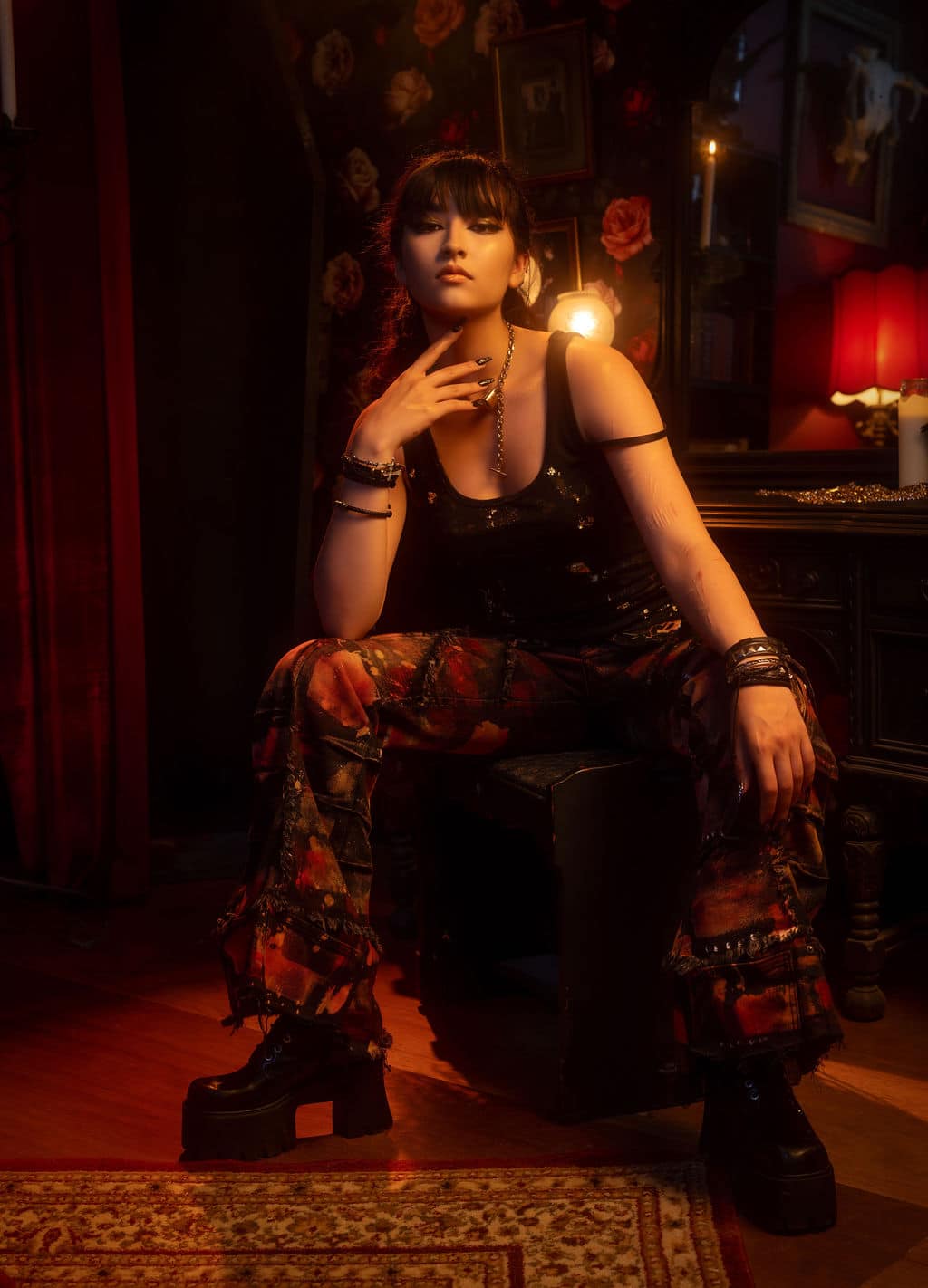
“Toast to the Broken” feels like a cathartic explosion of rage and youth. What brokenness were you toasting when you wrote it?
I think we’re all a little bit broken in different ways. And when we’re young especially a lot of us don’t know how to process that. In my case I use escapism and avoidance as my main vice, if something makes me feel good then there must be nothing wrong with me. The logic doesn’t make sense, and I know that, but for a while it felt easier to live like that then it would be to face the problem head on.
“Siren or the Sailor” has such a dark, haunting pull—especially with that line, “hold your breath, you’re only drowning.” What headspace were you in when that lyric surfaced?
I think especially with the new stuff, I was really playing with the concept of victim and villain. Especially as a woman, the idea of hunter vs hunted and, in a way, “blame” is a big part of my inner turmoil. Writing “Siren or the Sailor” I told myself not to think of anything specific and to just let the words come out as they wanted too. Because of that this song is deceptively one of the darkest. It’s haunting because I myself am haunted by the question of “is it all my fault for being the way I am?” Is it the Siren’s evil will or is that just how she evolved to survive? Am I the one being lured off of shore only to realise I’m drowning? I won’t get too specific because I think this line of thought has a broad range of relatability, but I also think this song is one many women in particular will understand at a soul level.
Your track “Race with no end” flips the energy, leaning hopeful. Was that balance intentional—to show light alongside the heavier themes?
“Race with no end” is definitely meant to be hopeful. Ironically, when I was writing it I wasn’t expecting it to take on such a hopeful tone but I’m so glad it did because you’re absolutely right, just as there are dark moments there are also light ones and that balance is important to exemplify.
“If you need me to be the villain (Then maybe I am)” sounds like reclaiming power through defiance. Do you think embracing the “villain role” can be freeing in real life too?
I absolutely think it is. Calling it a “villain” role, although catchy, is almost misleading because it is essentially, as you said, a reclaiming of power. It’s control over yourself. Standing your ground with conviction. I think especially as a woman I used to try so hard to be agreeable, as a lot of us do, but at a certain point we get sick of it. We’re starting to see this more lately as well, women teaching each other to be louder. To take up space unapologetically because we are worthy of being listened to and of being respected, and sometimes we have to demand those things and that will always cause discomfort among those that don’t want to give it.
“Fools Gold” is drenched in gothic theatricality and really feels like a climax. You’ve called it your most powerful song yet—why do you think that one hits hardest for you?
I’ve had this song written for ages and I waited forever to release it because I felt it really needed the right energy. This one is just so layered for me. I simplify it for press kits but there’s so much more to it. It’s desperation and disgust but at the same time there’s almost a romanticizing of the decay. It’s such pure emotion and that’s why I consider it my strongest song. The whole song has this intense almost restrained rage in it as well that I just adore.
Working with Kevin Thrasher and Maor Appelbaum, both with massive rock credentials, must have been transformative. How did their input elevate your vision for The Fool?
Both of them are so skilled at what they do! They definitely really brought my vision to life and I’m so grateful. Working with Kevin in the studio is always such a wonderful experience. Going in I usually have a super clear idea of what I want but this time it was very much a matter of letting the music go where it wanted too. No limits to what “genre” it had to stay in or how it had to sound, just pure vibes.
You’ve moved from a pop-centric sound into unapologetic rock. What sparked that shift, and how do you see your identity evolving as an artist now?
I actually have always been way more into that rock sound. My previous work is stuff I’m still proud of but it’s definitely not the most authentic version of me out there. This new sound is the truest to my soul I think I’ve ever released. I think some of the beauty of growth and evolution is that it’s unpredictable. I have such a strong connection to this harder sound because I feel it expresses emotions in a way that resonates with me, but who’s to say what those emotions will be 4 years down the line. I know without a shadow of a doubt, though, that I’m only going to get better.
Having grown up between Hawaii and Tokyo, and now shaping your career internationally, how does your cultural background feed into the way you write and tell stories in music?
I think growing up in Tokyo I was very fascinated by Japanese culture. It’s an old country with so much history that it naturally gained this kind of depth that you only really see developed after generations upon generations. My father’s lineage comes from samurai, so he’s always taught me about the honour system, the pride one takes in themselves. The work we do is a reflection of who we are as people. That is to say that the quality and effort of work we do, not necessarily the job itself. My mother’s background is Lebanese and once again, it’s this very old, very historic culture that has developed an insane level of depth also through the hardships of what the people have faced. The empathy of people is different when you have to come together as a community to survive. Compassion is different when you see with your own eyes the effect of it on your community. I think that connection to humanity is invaluable and something that has really been of benefit to my writing which is so steeped in the human experience and emotion.

